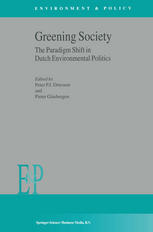

Most ebook files are in PDF format, so you can easily read them using various software such as Foxit Reader or directly on the Google Chrome browser.
Some ebook files are released by publishers in other formats such as .awz, .mobi, .epub, .fb2, etc. You may need to install specific software to read these formats on mobile/PC, such as Calibre.
Please read the tutorial at this link: https://ebookbell.com/faq
We offer FREE conversion to the popular formats you request; however, this may take some time. Therefore, right after payment, please email us, and we will try to provide the service as quickly as possible.
For some exceptional file formats or broken links (if any), please refrain from opening any disputes. Instead, email us first, and we will try to assist within a maximum of 6 hours.
EbookBell Team

4.1
70 reviewsThis book can be regarded as a monograph on the debates and developments in Dutch environmental policy. It has been written with a specific perspective in mind. First and foremost, the line of approach we have taken was from a multidisciplinary social science point of view. The trend in environmental policy is looked at from the angle of sociology, policy studies and political science. Secondly, all analyses depart from the paradigm shift concept. This particular paradigm shift is based on the fact that a radical change has taken shape over the years in the way environmental issues are handled. Previously, environmental policy had always been characterised by is top-down approach in which government determined the actual objectives of policy and assumed that it could win over business, non governmental organisations and citizens to act in line with those objectives. There was also a great deal of faith in the technical solutions to environmental issues. Today's environmental policy is based on a totally different philosophy. Environmental objectives are now reached in association with business, non-governmental organisations and citizens. These actors are also involved in bringing environmental policy into practice. In other words, the implementation of policy has a more interactive nature. New relationships emerge between government, the market and civil society, and policy discourses also become integrated. The environmental interest is more often weighed against the econom1c interests, the spatial development and against social justice.